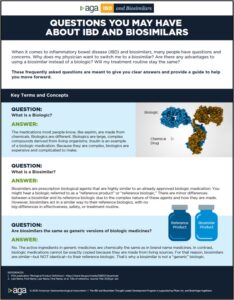

Living with: Ulcerative Colitis
Lives in: Santa Clarita, CA
Diagnosed: 2015
Taking a biosimilar for IBD since: 2018

Living with: Crohn’s Disease
Lives in: Chicago, IL
Diagnosed: 2013
Taking a biosimilar for IBD since: 2019
Of the various biologic medicines approved for treating IBD in the United States, two—adalimumab and infliximab— currently have biosimilars available.
Adalimumab Biosimilars
- Abrilada (adalimumab-afzb)
- Cyltezo (BI 695501) (adalimumab-adbm)
- Hadlima (SB5) (adalimumab-bwwd)
- Amgevita (adalimumab-atto)
- Hyrimoz (adalimumab-adaz)
Infliximab Biosimilars
- Ixifi (infliximab-qbtx)
- Renflexis (infliximab-abda)
- Inflectra (CT-P13) (infliximab-dyyb)
Although you should expect no difference in treatment outcomes with a biosimilar than the biologic you are currently using, biosimilars increase your treatment options and may even save you money, depending on your health plan. You can feel confident that biosimilars work are just as safe and effective as their reference biologic, whether you start treatment with them or switch to them later.
To approve a biosimilar, the FDA compares safety information for patients previously treated with the reference product who transition to a biosimilar. Before a biosimilar can be switched back and forth more than once in patients, the FDA also requires the manufacturer to show that treatment will be equally safe and effective by carefully reviewing studies, checking quality of medication during the manufacturing process, and reviewing patient safety reports to the FDA after approval.
Yes, a biosimilar is given the same way as its reference biologic medication, so your treatment routines and quality of care should be identical. The biosimilar will be given the same way, and have the same strength and dosage, potential side effects, and treatment benefits. You can expect the same safety and efficacy you expect with the reference biologic and the same monitoring strategy for any adverse effects.
Possibly. Although one reason Congress created an efficient approval pathway for biosimilars was to reduce health care costs, your cost will depend on the pricing and reimbursement policy of your insurance plan, something the FDA does not regulate. The best way to determine your personal cost of care is to check with your insurance provider or, if you are covered by Medicaid or Medicare, the Centers for Medicare & Medicaid Services (CMS).
If you need help with out-of-pocket costs insurance companies may offer co-pay assistance for eligible patients. You can check with representatives of the pharmaceutical company that manufacturers your biosimilar about insurance coverage, including any out-of-pocket costs, and options for co-pay assistance.
Your health care provider should be able to answer any other questions you have about preparing for treatment with a biosimilar, expected benefits, potential side effects, insurance coverage, and additional educational resources. The FDA also provides useful online materials about biosimilars in general, including “Biosimilar Basics,” a consumer update on biosimilars and interchangeable biologics, and two infographics:
Both health professionals and patients can also find out whether any given medication prescribed is a biosimilar, reference biologic, or interchangeable product on the FDA’s “Lists of Licensed Biological Products with Reference Product Exclusivity and Biosimilarity or Interchangeability Evaluations,” (the “Purple Book”).
